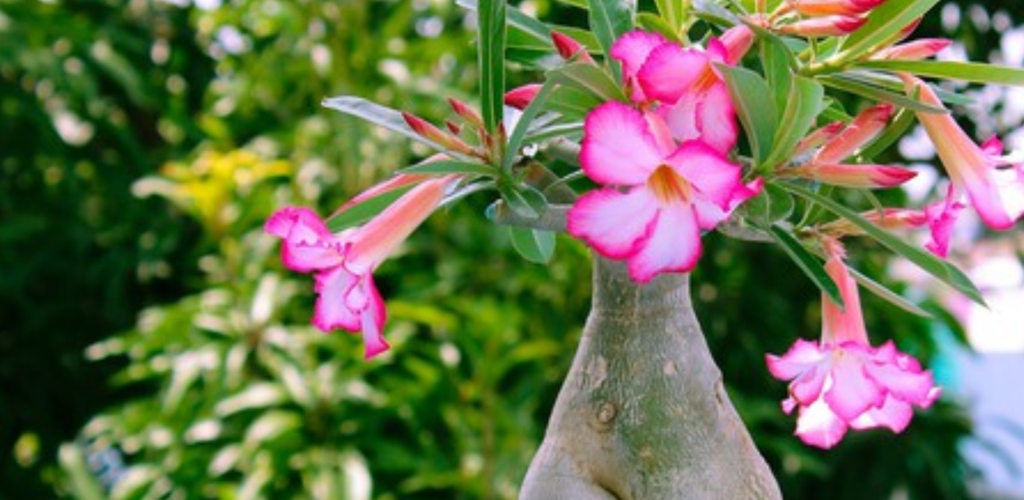Growing the Desert Rose is like caring for a treasure: give it sunlight, moderate water and well-drained sandy soil. Explore this fascinating world and discover the secrets to making it bloom with beauty and grace in your home.
Desert roses originate from the deserts of Africa and the Middle East. Their flowers are bright, similar to those of the oleander. They are a succulent, so they grow naturally in hot, arid areas. They do particularly well when given love and attention. In this article, we will show you how to grow desert roses and all the necessary care.
Summary
- Name: Desert rose (Adenium obesum)
- Height: up to 2 m in the ground, but less in a pot; ideal for bonsai
- Foliage: elongated, medium green, tough; deciduous.
- Climate : subtropical to tropical, arid; tolerates cold nights.
- Soil: Prefers well-drained, sandy soil.
- Position: sunny, open location; light shade from midday sun
- Bloom: Single rose-like flowers in a variety of colors and combinations
- Feeding: Use a long-lasting controlled release fertilizer sparingly.
- Watering: Water when conditions are hot and dry; good drainage is essential. Do not water during dormant period.
Appearance and characteristics of the desert rose
The desert rose is a succulent, but unlike most succulents, it doesn’t have swollen leaves. Instead, it has a swollen, belly-like trunk known as a caudex, which acts as a moisture storage. It looks more like a tree than a typical succulent.
Its leaves are small and medium green. Desert rose flowers are very similar to those of the oleander in shape. They have five equally sized and widely spaced petals surrounding a central yellow “eye”, each on its own short stem.
Colours range from pink to deep red, with many variations and combinations available. Flower size will depend on growing conditions, but average size is about 5cm.
How to grow desert rose
Growing desert rose from seed can be tricky. The plant produces seeds after flowering, but the resulting seedlings are variable. To get a true-to-type plant, take stem cuttings when they are dormant.
Desert roses can be planted outside in the garden in warm, tropical and arid climates, but are most commonly grown in pots or as bonsai. They are not an “indoor” plant – they can be brought indoors for short periods while in flower, but they prefer to be outside in a warm, sunny spot, away from cold winds.
If you are going to plant the desert rose in the garden, follow these steps:
Choose a sunny position; in tropical and arid areas, a light shade from midday onwards will protect it from sunburn.
Plant it so that the base of the caudex (trunk) is at or just above ground level.
The soil should be free-draining and gravelly, but richer soil will be tolerated.
Add a long-term controlled-release fertilizer during soil preparation.
If you plant the desert rose in a pot, follow these steps:
A terracotta or porous clay pot is preferable as it drains well and dries more quickly than plastic, ceramic or fibreglass.
Add a shallow layer of pebbles or clay balls to the base of the pot to further improve drainage.
Use a high-quality cactus and succulent potting mix.
Place the desert rose in the pot so that the base of its caudex is at or slightly above the top of the potting mix.
Place the pot in a protected location for about a week to overcome transplant shock, then place it in sunlight.
Light shade from midday onwards will minimize leaf scorch.
To grow desert rose as a bonsai, follow these steps:
Choose a shallow bonsai pot or bowl that is proportionate to the size of the plant. Make sure the pot has enough drainage holes.
Remove the plant from the pot.
Trim the roots so that the base of the caudex is above the rim of the pot or bowl and the roots fit snugly inside the pot.
Cut a piece of wire mesh to fit snugly around the base.
Keeping the plant in position, fill and surround its roots with a premium bonsai potting mix.
Water well to settle the mixture.
Trim the top of the plant to start the training process.
Place the pot in a sheltered location for a few weeks before gradually introducing it into an open position.
If possible, provide light shade from midday onwards.
Desert Rose Care
Like other succulents, the desert rose needs regular watering, especially during hot and dry periods.
“Encourage flowering by using a water-soluble or liquid fertilizer in spring and summer
Once a year, a long-term controlled-release fertilizer can be added around plants in the garden and containers. Again, use sparingly.
Pruning the desert rose
When grown in the garden, the desert rose responds well to light pruning to maintain its shape. Trim only in the dry season to prevent infection from entering the cuts.
The tips of a desert rose bonsai should be trimmed every few months, but you need to be mindful of where the flowers are coming from and not trim beyond these points before the flowers have appeared.
Diseases and pests
The desert rose is reasonably disease-free, and is rarely affected by pests. If aphids or scale insects are present, a light spray with white oil or insecticidal soap may be applied.
